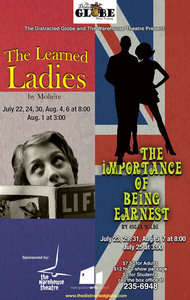July 25, 2010
A Hundred-Some Fans and One Cantankerous Naysayer
 Jennifer Goff of The Distracted Globe has set herself the arduous task of adapting Moliere's 1672 Les Femmes Savantes to New York, 1930. And she kept the convention of rhyming couplets.
Jennifer Goff of The Distracted Globe has set herself the arduous task of adapting Moliere's 1672 Les Femmes Savantes to New York, 1930. And she kept the convention of rhyming couplets.
In keeping with true review form, the next sentence should propose some sort of value judgment of the production. This is tricky. In complete honesty, I'll admit that I did not particularly enjoy the show. But then, in complete fairness, I'll tell you that I was the only person in the audience who didn't.
I have never (never!) heard an audience become so invested in a play. I am accustomed to The Excessively Loud Individual who annoys the rest of the patrons with his demonstrative responses. The Learned Ladies was my first experience with an entire audience hooting, howling, groaning, yelling at the characters (and at each other), clapping in the middle of scenes, and laughing with abandon.
Moliere's play lampoons hen-pecked husbands, domineering women, googily-eyed romantics, and those obnoxious fake intellectuals who say nothing of value (and write very very bad poetry). It's a fun story with our favorite caricatures, and the production serves up some beautiful acting. Stephen Boatright (straight-man Artie) and Kerrie Seymour (wife-from-Hades Phyllis) are entirely convincing; Cindy Mixon (the lusty Bessie) and Joel Perkin (the weak-kneed husband Chester) are literally a hoot. The staging is by turns corny and brilliant--the firing of the maid and the swooning over lousy poems are both crackling scenes that I would gladly re-watch.
So why didn't I enjoy the show? I didn't feel the production gave me liberty to do so. The play (remember) is composed entirely in rhyming couplets. Bad rhyming couplets. Really, intentionally bad rhyming couplets. The first ten minutes found the actors struggling against the language--trying to mask the galloping rhythm and obvious jangles. This straining set-up did not give me permission to groan at (what I perceived to be) the adaptation's gloriously self-conscious corniness. I was programmed to think--"Oh, what horrid greeting-card language. Let's cover that up."
Within this framework, the script worked best when its actors were able to completely overcome the clunky rhythm (in which task Seymour and Boatright excel) or occasionally when they could clue me in that they were going to ham-it-up on the obvious rhymes (Mixon and Perkin's domain). Given these two modes, the play seemed conflicted about itself--were these bad rhymes meant to be taken seriously? Or no? Or (given the audience's obvious delight) was I just one of those wretched Learned Ladies (shudder) who think too hard about everything? I don't know.
I do know that my fellow audience members had a lot more fun than I did, and I found myself wishing I could enter into their infectious glee. So. Here is my proposition of judgment: This disparity in our reactions says something very good about the production. If the entire audience has a middling-good experience, something is amiss; Theatre is supposed to be about heightened experience (be it positive or negative), and in this The Learned Ladies overwhelmingly succeeds. And given the ratio of ayes and nays (only 1 opposed and a nearly full house in stitches), it's a pretty safe bet that you'll do more than enjoy the show. You'll love it. And when you do, please hoot a little on my behalf.
--
Moliere's "The Learned Ladies," Adapted and Directed by Jennifer Goff
Presented by The Distracted Globe at Warehouse Theatre, 37 Augusta St., Greenville (864) 235-6948. Through August 7. Tickets $7.50.